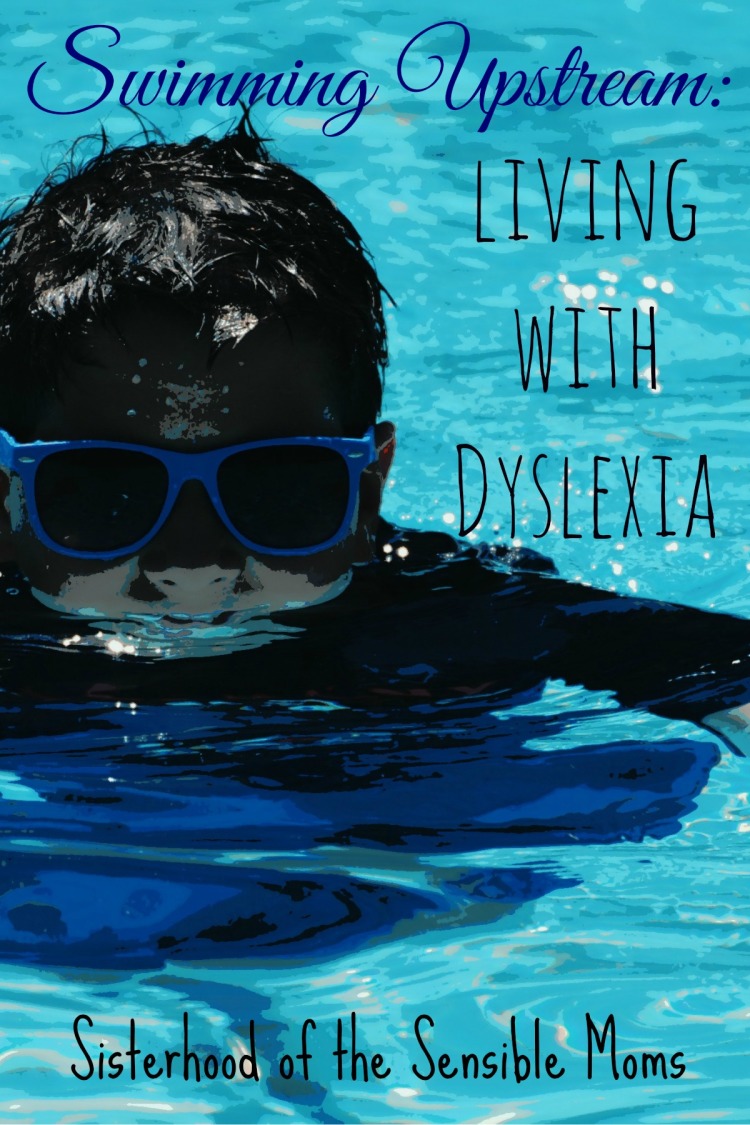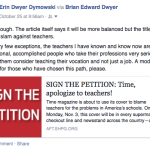Grrrr. Nothing like an inbox full of missing assignment notifications from school to enjoy with my morning coffee and bowl of cereal. It’s way too early to pretend that I’m not annoyed with my middle-schooler, but if I’m honest, I’m a little defeated too. These missing assignments have become a regular event around here. This is not eighth-grader-itis or I’m-too-cool-i-osis. This is not a byproduct of too much screen time or a symptom of an over-scheduled kid. This is what dyslexia looks like, at least in my house.
My middle son has dyslexia. When he was four, my precocious funny boy was quoting back entire passages from books, picking out the different instruments in “The Nutcracker” and teaching himself how to ride a bike and a skateboard. He was also really struggling to learn the letters of his name. I took him to a group of specialists in Washington, DC who tested him for 5 hours. When they emerged from the testing room with him, the center’s director was laughing and she turned to me, “If you ever tire of him, I’ll take him.” She also said that the testing was inconclusive. There were worrisome issues with some visual processing areas, but he had some real gifts in verbal comprehension and non-verbal processing. And so the story has gone for years even up until this semester. Dyslexia is a slippery fish and we recognize it more in the shadows than the light.

My son is smart enough and socially gifted enough to swim with the other kids in the classroom who do not share his diagnosis. In fact, if you had to visit his classroom, you would be hard-pressed to pick him out of the crowd of sweaty eighth graders at first. If you hung around long enough, you would see him start to bob a little. You would notice how hard it is for him to copy notes from the board. You would see that it takes him longer to read a passage, and you would sense his anxiety when presented with a lot of visual information all at once. Dyslexia can look like attention issues and tiredness and even laziness. But how it looks is nothing compared with how it feels.
Tiring, exhausting, confusing, and confounding: dyslexia checks every one of those boxes and then some. Just last week, I used the word flummoxed to describe how I felt about my son’s current academic situation, and we really are. My husband and I worry about his future constantly. His potential rarely matches his performance. We have older kids so we know that this is not a recipe for success. We are well aware of all the pitfalls waiting for kids who are not successful academically. Our eyes are wide open and are hearts are willing, but our path forward is uncertain. My emotional state is all over the place as we deal with the fallout of the issues dyslexia brings, but that’s nothing compared to what it’s like for my son.
For the most part, my son just keeps swimming along. Sure, he is working a little harder than everybody else, using up those reserves a little quicker, and pushing himself to the breaking point a little faster, but that’s just how school is for him. Sad to say, but school has always been a difficult place so he is used to the daily struggle.
But sometimes he gets overwhelmed. A difficult assignment, a missed class, or just too much work in one week can provide the tipping point that takes him from finishing to flailing. At moments like this, he is swimming upstream through rough seas with fogged goggles. He quite literally loses his way at the same moment he runs out of steam. These are the moments when the waves crash over him and he starts to sink. Then those emails start filling up my inbox.
So now we are back in the unenviable position of circling the wagons and trying to regroup. We are all stressed out and cranky at having the same conversations, worn out and tapped out confronting the same issues, exhausted and deflated treading the same water. School is a marathon not a sprint so we keep repeating this mantra hoping that it will bring peace and focus. School rewards the long view and the courageous return to the journey every single day, so we tell him to keep moving forward despite how unproductive he might feel. School forgives momentary failures and allows us to learn from our mistakes, so we help him brush off losses and find strength in small victories.
Today these emails are peeving me, but they are also tangible reminders of the rough seas that mark my son’s marathon journey through school. So I will remind myself to channel patience and understanding for something beyond my experience. I will take deep breaths and try not to scream or lecture. Today, I know we will do what we have always done for him: throw him a lifeline, extend our hand, pick him up.
Today, like every day, we will pray that he will just keep swimming.
-Erin
You can follow us on Google+, Twitter, Facebook, Instagram, and Pinterest.
Check out our books, “I Just Want to Be Alone” and “You Have Lipstick on Your Teeth.”
















Hi, I am a 26 year old dyslexic and I have been recently looking into what it means to be a dyslexic and that’s how I stumbled across this blog. I just wanted to share a bit about my experience and my findings. What I have found is that dyslexia is an intrinsic part of who I am. It is not a disability like it felt when I was going through school but rather a huge gift. We see and interact with the world differently than anyone else and this gives us a huge advantage over others in our chosen fields. When I was doing my undergrad in film, Half of my crew was dyslexic and we were at the top of our major. We were the ones that were sought after, the ones that everyone wanted to work on their projects. Most of us are now award winning filmmakers or have good jobs in our field. I say this not to brag but to give you hope. Along with the reading and math difficulties we were given a heightened understanding of people, mechanics, and learned the value of collaboration. Getting your dyslexic into other programs or activities that allow them to use those skills is invaluable. It will show them that they are capable, intelligent people who belong and that confidence will give them a platform from with to tackle the things we struggle with as well as a direction and hope for the future. For me, it was making films with my friends. For some it’s piloting aircraft, building computers, woodworking, photography, graphic design, and oh so much more.
Here is a link to a site you have probably already heard of but I’m going to give it anyway. http://www.dyslexia.com/library/symptoms.htm. I was floored when I read this and the traits of dyslexia in adults because it was me on paper. It even included things that I thought of as personality quirks. Anyway it’s worth a read.
Jaime, thank you so much for this. You have no idea how much I needed to read this today. I think of my son as differently abled and this feels like him and reflects his gifts. I so appreciate this comment. More than you know. Erin
Sorry to butt in again but, I have been thinking a lot about you and your son and all the other parents with dyslexic kids who read this blog. I feel like I should share some of the things that helped me in case there are people out there that this stuff will work for too.
The first is very important for me. I am one of the dyslexics that focus better while doing multiple things at once. When doing homework, I concentrated best with the TV on. It sounds crazy and was hard for my parents to get on board with but it worked. Whatever I put on the TV needs to be something I am familiar with or a show I’m not interested in because if it is new I find it distracting. I never truly realized how important this was for me until I was in college and I went with a friend to the library to study. It was so quiet and uneventful. My friend finished all of her work and I did not complete a single thing because I couldn’t concentrate and kept getting distracted. This was also true of my roommate in college who was dyslexic and needed to have music on while doing her homework. To this day, I edit films with the TV on. Talk about stimulus, two sets of video and audio plus the process of editing. Crazy, but it’s how I function.
Second is reading. Audio books helped me keep up with the rigors of junior high and high school reading schedules. The person on the tape read faster out loud than I could read by myself. This allowed me to follow along in the book, take notes, and finish my assignments on time with the rest of my class. There were several times when my mom and I had to make choices between getting homework done and doing it the “proper way.” Together we decided that getting the work done and getting a good grade plus sleep out weighed the practice benefits of reading it myself. Sometimes you need to go around the wall, not through it. Audio books are a good fail safe for when you fall behind. Then over the summer when I had no pressures from school we practiced reading. I found that I read dialogue easily while the rest of the book slows me down. Reading scripts like Shakespeare or graphic novels and comic books got me interested in reading and boosted my confidence because I could fly through them. Short books were also a good solution because progress was visible and made me few good about how much I had read in a short amount of time. All of these made me want to read more because I didn’t feel defeated, I felt like I was winning. After that I would be geared up for school with self esteem and the benefits of having done so much practice.
Third is vision therapy. This is apparently something that a lot of dyslexic kids need but it is often overlooked. Dyslexia causes trouble reading like headaches, jumping from one place on the page to another, perceived movement, ect. These are also symptoms of eye malfunctioning. I have 20/20 vision but my eyes focused at different rates and it compounded my reading difficulties. After vision therapy in sixth grade, my grades jumped from B’s and C’s to straight A’s and stayed that way till I started AP classes. I suddenly was able to finish my homework and keep up with the class as well. Also, I quit constantly loosing my place while reading, jumping lines, and perceiving movement.
Fourth is making learning interactive. Most dyslexics learn through experiencing the material. Taking stressful things like spelling tests and making them games relieved a lot of anxiety for me and I learned faster. We would sometimes even play trivia games to study for tests. Making stories out of things helped as well. Doing this enabled me to remember the facts because I remembered the experience. It also kept up my morale. For math, making it tactile with physical items I could move and act out how addition, subtraction, multiplication, and division worked helped immensely. Though I was never able to recite my multiplication tables instantaneously, I grasped the concept and was able to do my work correctly.
Fifth and last, is speech therapy. I was lucky enough to be born to a speech therapist and since raising me, she specializes in helping other kids with dyslexia. There is a lot of training and tons of resourses out there that the rest of us don’t have access to and that’s where the speech therapists come in. They do way more than “speech” and there is a lot they have to offer to those of us who were precocious children with no problems talking. My mom helped me get around reading issues, spelling issues, math issues, and so much more. Speech therapists teach us how to take what we are given to learn from and change it to make it easy for us. They help troubleshoot issues and lay a foundation for our futures. It didn’t just get me through school, it gets me through daily life as an adult.
I’m sorry about the book, I ended up writing much more than I thought I would. I know that most of this is probably completely redundant and not helpful at all but hopefully there is a nugget in there somewhere. I hope I wasn’t too out of place. Again, sorry about the verbal spillage.
Jaime, I so appreciate this. I’m thinking that you need to send me your contact info to Erin at sisterhoodofthesensiblemoms@gmail.com. Maybe we could put a post together with some of your ideas. Thank you! Erin